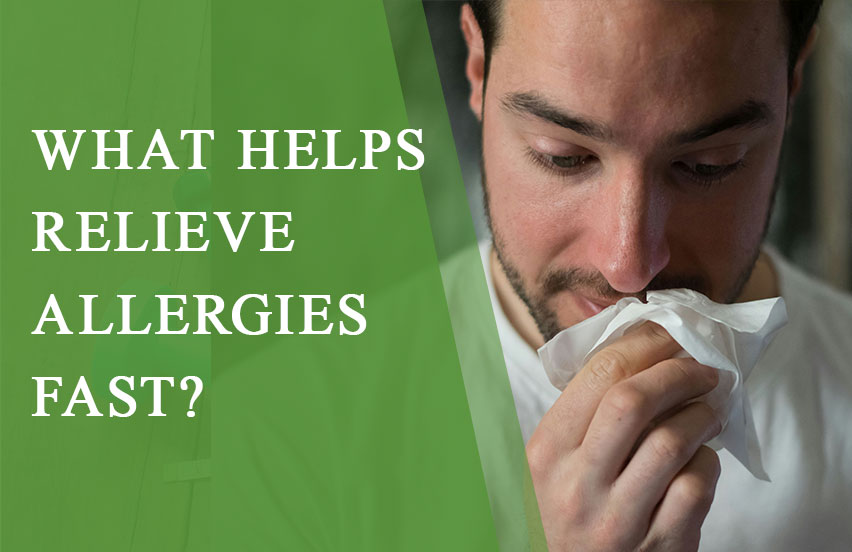
Overview of Allergies and Common Symptoms
Sneezing, runny nose, or itchy eyes? If so, you may be experiencing allergy symptoms.
Introduction to allergies and their impact on daily life
Allergies can strike at any time, and when they do, they disrupt your daily routine. But don’t fret! There are various methods to alleviate these inconvenient symptoms right away.
Common symptoms of allergies and their effects on individuals
Common symptoms include sneezing, congestion, and itchy eyes, among others. You can quickly relieve these symptoms using antihistamines, nasal sprays, eye drops, or even natural remedies like nettle leaf or quercetin supplements.
Over-the-counter medications for Allergy Relief
When battling allergies, you crave the sweet relief that only effective remedies can provide. There are two over-the-counter medications popularly linked to allergy relief: antihistamines and decongestants.
Antihistamines: Types, mechanism, and effectiveness
Antihistamines like Claritin or Zyrtec block histamine, a body chemical involved in allergic reactions. It can tamp down typical allergy symptoms like itching, sneezing, and hives. They work best when you take them ahead of exposure to allergens.
Decongestants: How they work and when to use them
Decongestants provide fast-acting relief for nasal and sinus congestion. They work by narrowing blood vessels, thus reducing swelling and congestion. Just ensure you use them for a short period to avoid rebound effects.
Natural Remedies for Allergy Relief
If you’re struggling with allergies, you’re interested in finding quick, effective relief. Fear not. There are ways to alleviate your symptoms, starting with natural remedies.
Herbal Supplements: Promising Alternatives and Their Benefits
Herbal supplements are a godsend for many allergy sufferers. For example, butterbur and quercetin are known for reducing inflammation and blocking histamine release, offering significant relief to hay fever or seasonal allergy symptoms.
Nasal Rinses: Effectiveness and Proper Usage
Secondly, nasal rinses like the famous Neti Pot flush out allergens from your nasal passages, providing almost immediate relief. However, always use distilled or sterilized water and clean the neti pot thoroughly to avoid further complications.
Lifestyle Changes to Reduce Allergy Symptoms
You might be looking for some quick relief from your allergies, and the good news is you can deal with your problems in many different ways.
Environmental control: Tips for minimizing exposure to allergens
One effective way is environmental control. It involves minimizing exposure to environmental allergens, such as dust mites, animal dander, or mold. Regular dusting, air filters, dehumidifiers, and hypoallergenic beddings can help.
Dietary adjustments: Foods and nutrients that may help alleviate allergies
Another way is dietary adjustments. Eating foods rich in Vitamin C, quercetin, and omega-3 fatty acids may offer some relief. Foods like pineapple, apples, fatty fish, and onions are anti-inflammatory and could help reduce allergy symptoms. Hydrating well can also help soothe the throat and clear up the sinuses.
Consultation with a Healthcare Professional
When relieving allergies fast, seeking medical advice from a healthcare professional is your best bet. Allergies can vary in severity and symptoms, so getting an accurate diagnosis and personalized treatment plan is essential.
When to seek medical advice for allergies?
Suppose you’re experiencing persistent or severe allergy symptoms affecting your daily life. In that case, it’s time to consult a healthcare professional. These symptoms include frequent sneezing, itchy or watery eyes, nasal congestion, coughing, or difficulty breathing. They might suggest allergy tests to determine which allergens are worsening your symptoms.
Overview of allergy testing and treatment options
You can find out what allergens are worsening your allergies by getting an allergy test. It can be done through skin prick tests, blood tests, or sometimes elimination diets. Once your allergens are identified, your healthcare professional can recommend a suitable treatment plan. It may include:
- Avoidance: Avoiding exposure to allergens is the first line of defense. Your healthcare professional can guide you on minimizing your exposure to triggers.
- Medications: Depending on the severity of your allergies, over-the-counter or prescription medications such as antihistamines, nasal sprays, or eye drops may be prescribed to alleviate your symptoms.
- Immunotherapy: In cases of severe allergies or other ineffective treatments, allergen immunotherapy may be recommended. It involves regular injections or sublingual tablets that help your body build immunity to specific allergens.
Always consult a healthcare professional for personalized advice and treatment options based on your allergy symptoms.
Conclusion
When allergies strike, it’s essential to find relief quickly to return to enjoying life. By incorporating a combined approach to allergy relief, you can effectively manage your symptoms and find comfort. Remember to talk to your doctor to determine the best treatment choices. Don’t hesitate to try different remedies until you find what works best for your specific allergies. With the right approach, you can relieve your allergies fast and get back to living without the discomfort they bring.
Frequently Asked Questions (FAQs) about allergy relief.
Q: How can I relieve my allergies fast?
A: There are several ways to find fast relief from allergies. It can include over-the-counter antihistamines, nasal sprays, or eye drops to alleviate allergy symptoms.
Q: Can natural remedies help with allergy relief? A: Natural remedies such as saline nasal rinses, steam inhalation, and a humidifier can relieve allergy symptoms. However, it’s important to note that everyone’s allergies are different, and what works for one person may not work for another.


